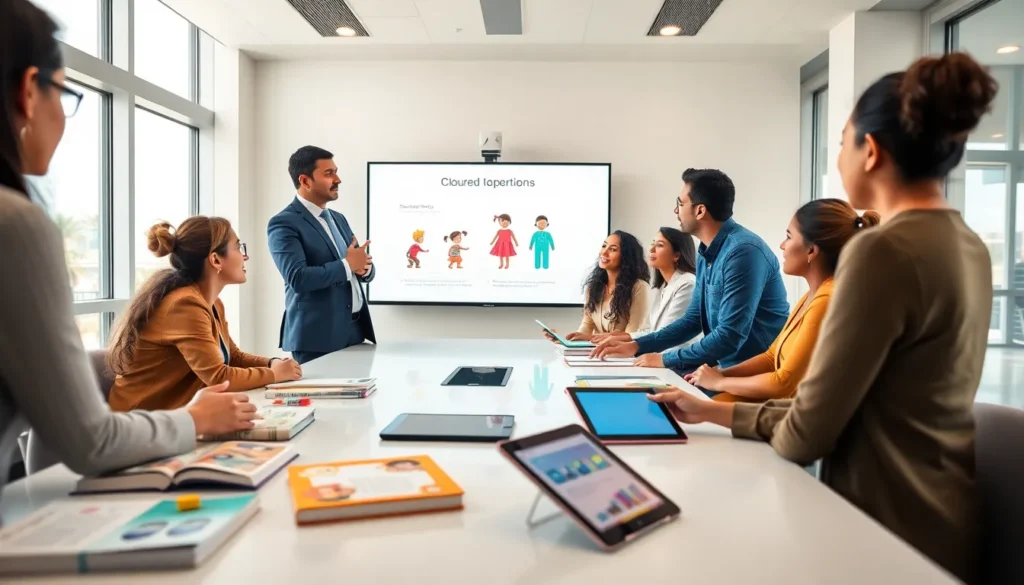Ever wondered what makes children tick? From their first babble to their teenage angst, the journey of child development is nothing short of fascinating. You might be thinking, ‘Sure, but how does that help me, right?’ Well, if you’re passionate about nurturing young minds, be it as a parent, teacher, or professional, child development courses might just be your golden ticket. Imagine diving into the psychology behind why your toddler throws a tantrum or why your teenager is suddenly immersed in social media. Whether you’re looking to advance your career or simply increase your understanding, these courses equip you with valuable insights that can be applied in various settings. So, let’s explore this enchanting world of child development courses. Buckle up, because the journey is as enlightening as it is essential.
Table of Contents
ToggleUnderstanding Child Development

Stages of Child Development
Child development unfolds in distinct stages that every child undergoes, often categorized into infancy, early childhood, middle childhood, and adolescence. Each stage carries its own unique set of challenges and achievements. Infants gradually learn to crawl, walk, and communicate, laying the groundwork for later development. Early childhood is often where language skills flourish, while middle childhood marks a spike in cognitive abilities and social interactions. Adolescence, on the other hand, sparks a whirlwind of physical changes and emotional challenges that can leave both kids and adults scratching their heads.
By grasping these stages, individuals undertaking child development courses gain a clearer picture of what to expect at different ages. This understanding empowers them to better support children as they navigate the complexities of growing up.
Importance of Developmental Milestones
Developmental milestones offer markers to gauge a child’s progress. Mastering these milestones is crucial, as they reflect critical areas such as emotional, social, and cognitive growth. For instance, an 18-month-old should begin to say a few words, while a 5-year-old should be able to hold a conversation. Missing these milestones may indicate developmental delays, prompting early intervention where necessary. In child development courses, learners dive deep into recognizing these milestones, equipping them with the skills to monitor and foster a child’s growth effectively.
Types of Child Development Courses
Online vs. In-Person Courses
The rise of technology has ushered in an era of online child development courses, allowing for flexibility that traditional in-person classes can’t match. With online courses, learners can access materials at their convenience, making education accessible to anyone with an Internet connection. But, in-person courses offer interactive environments that can foster discussions and hands-on experiences. Choosing between the two largely depends on individual learning preferences and schedules. Some may benefit from the structured environment of a classroom, while others may thrive in the comfort of their home.
Certification and Degree Programs
For those seeking formal education, certification and degree programs stand at the forefront. Certifications often cater to specific areas or skills, providing a quick, targeted pathway to enter or advance in the field. In contrast, degree programs, such as Bachelor’s or Master’s in Child Development, represent a comprehensive approach, blending theory with practical experience. Graduates armed with these degrees find themselves well-prepared for various roles in education, healthcare, and social services.
Specialized Courses for Specific Needs
Not all children fit the cookie-cutter mold, and specialized courses focus on specific challenges such as autism spectrum disorders or developmental delays. These courses jump into tailored strategies and techniques, equipping participants with essential tools to meet each child’s unique needs. This specialized knowledge can be invaluable not only in professional settings but also in parenting.
Benefits of Enrolling in Child Development Courses
Enhancing Professional Skills
Whether you’re a teacher, healthcare worker, or a dedicated parent, enrolling in child development courses can significantly enhance your professional skill set. Understanding child development theories empowers students to carry out effective strategies in their day-to-day interactions with children. Engaging with contemporary research and case studies further prepares learners to face real-world challenges with confidence.
Increasing Parental Awareness and Involvement
For parents, knowledge is a powerful ally. Courses equip them with the understanding needed to support their children’s growth actively. Learning about developmental stages and milestones can transform parental involvement from passive observation into active engagement. Parents who understand child development principles are better equipped to nurture their child’s potential, setting the stage for lifelong learning and growth.
Career Opportunities in Child Development
Roles in Education and Healthcare
Child development courses lay the groundwork for diverse career paths, particularly in education and healthcare. Graduates may find themselves in classrooms, working as early childhood educators or school counselors, armed with insight into age-appropriate teaching techniques and emotional support strategies. In healthcare settings, professionals can pursue roles as pediatric occupational therapists, child psychologists, or family support workers, making significant impacts on children’s health and wellbeing.
Advocacy and Policy Making
Graduates can also venture into advocacy and policymaking. Child development courses instill a strong understanding of the social and environmental factors affecting child growth, equipping individuals to address and advocate for essential changes in policy or community programs. Their knowledge serves as a catalyst for creating supportive environments where children can thrive.
How to Choose the Right Child Development Course
Assessing Course Content and Structure
When considering a child development course, it’s crucial to assess the course content and structure. Look for programs that cover essential theories, practical application, and recent research findings. A well-structured course offers a blend of lectures, interactive discussions, and practical assignments, ensuring participants are engaged and learning effectively.
Evaluating Instructors and Their Qualifications
The importance of instructors cannot be overstated. Evaluating their qualifications, experience, and teaching style can significantly influence the learning experience. Engaging and knowledgeable instructors who bring real-world experience can make all the difference. Look for testimonials or course reviews that shed light on the instructor’s teaching effectiveness and approach.



